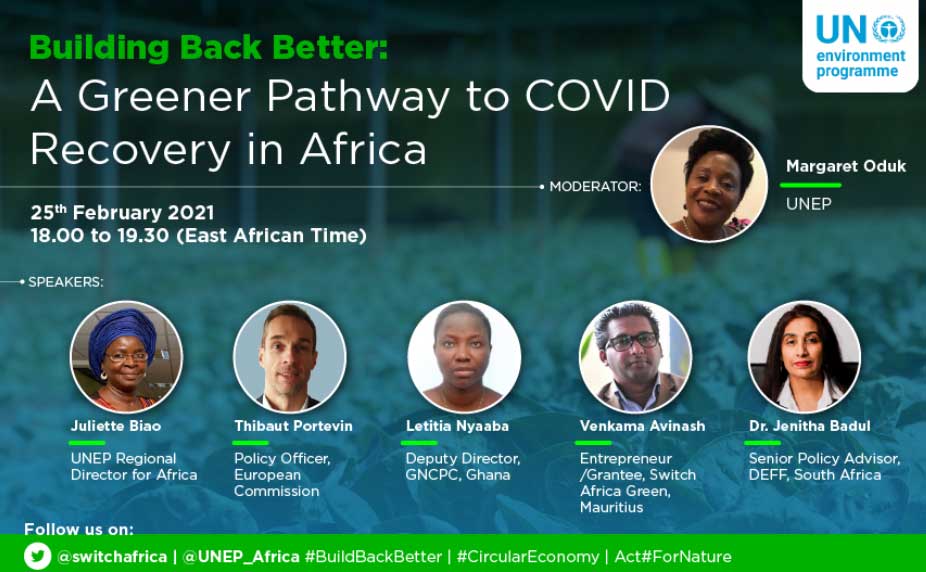An event organized by the SWITCH Africa Green programme discussed a greener pathways to COVID Recovery in Africa. The discussion was an opportunity for countries’ representatives to share lessons on policies and strategic approaches towards economic recovery. More than 80 attendees followed the online debate on February 25, 2021 that was supported by the European Union.
Patrick Mwesigye, UNEP Regional Coordinator of Resource Efficiency, on behalf of Ms Juliette Biao Koudenoukpo, Director and Regional Representative for Africa, UNEP, said: “We have to ensure that Africa’s economic recovery is well-integrated and aligned to the 2030 agenda and the Africa 2063 Agenda as well as multilateral agreements.”

Mwesigye called upon African countries to invest in the Africa Green Stimulus Programme that was endorsed at the Eighth Special Session of the African Ministerial Conference on the Environment (AMCEN), to put the continent’s economies on a more greener and sustainable pathway.
Thibaut Portevin, Policy Officer for Green Economy, the European Union, said that COVID-19 pandemic has confirmed that the economy is fragile to shocks like environmental risks.
“In December 2019, the EU adopted the Green Deal, a growth strategy that has triple objectives, competitiveness, environmental sustainability such as tackling climate crisis, ecosystems degradation and pollution, and social justice and inclusion. These are top priorities of the European Commission. It is based on actions in several areas including circular economy, sustainable ecosystem, construction, green energy and sustainable finance,” said Portevin.
The Green Deal has remained a priority of the European Commission, but it has also been the blueprint and compass to guide EU’s efforts towards recovery plan. For instance, the EU recovery and resilience facility worth EUR560 billion with a commitment of 37 per cent expenditure corresponding to the priorities of the Green Deal, including investment in sustainable buildings, green building and circular economy is key to the green deal as it is an opportunity for job creation.
In her intervention, Jenitha Badul, Senior Policy Advisor, National Department of Environment, Fisheries and Forestry (DEFF), South Africa, said: “The Green economy agenda, which has been pursued by UNEP since 2009, follows the path of low-carbon-climate resilient economy and more so with circular economy agenda. It is focussed more specifically on resource efficiency.”
Badul mentioned that in October 2020, South Africa President announced reconstruction and recovery plan aligned to green economy. With financing towards low-carbon economy, South Africa plans to transition to a low-carbon economy by 2030.
“We need to look at homegrown technologies to sustain our economies in medium and long-term through investment in research and development,” added Badul. Warning that African countries are at different levels of development, particularly skills set on circular economy.
Talking on behalf of UN Economic Commission for Africa (UNECA), James Murombedzi, Senior Political Affairs Officer confirmed that COVID-19 is endangering long-term development across the continent and exposing the underlying weaknesses of many of our economies. He noted that the continent is facing the worst economic recession in 25 years with economic losses amounting to an estimated US$99 Billion.
According to UNECA, the African labour market has lost close to 30 million jobs as a result of the COVID-19 pandemic. African businesses are running at less than 45 per cent of their pre-pandemic capacity levels. This is illustrated for instance by the effect that airlines have shed 4.5 million out of the region’s 6.2 million aviation-related jobs. Countries should begin to draw up plans for kickstarting economic and social recovery.
Representing SWITCH Africa Green beneficiaries, Venkama Avinash said that COVID-19 pandemic has deeply affected tourism sector in Mauritius. However, amid the pandemic, hoteliers have changed their mindsets towards domestic tourist’s unlike pre-pandemic where hotels relied on foreign tourists.
“There is an emergence of business entrepreneurs, especially in domestic tourism such as food deliveries, taxis and food suppliers, which traditionally were overconcentrated in international hotels and export markets,” concluded Avinash.
Article first published on SWITCHAfrica Green.
The online event was organised by UNEP in partnership with SWITCH Africa Green, European Commission, ARSCP und UNECA

